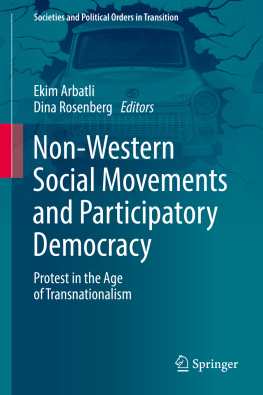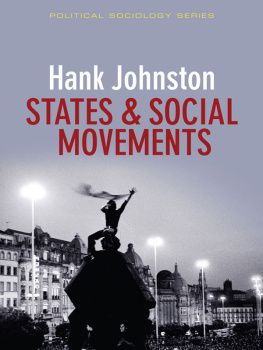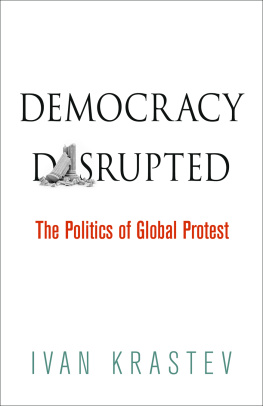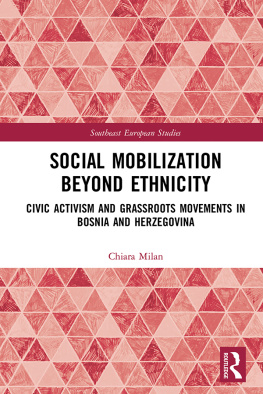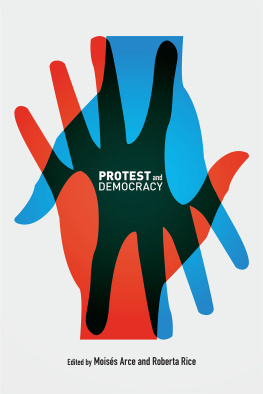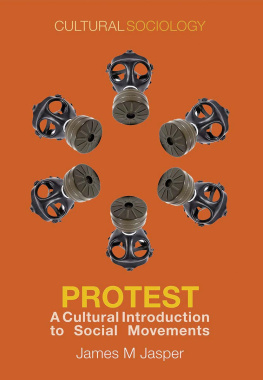Introduction
The last decade has witnessed a surge of large-scale protests and social mobilization around the globe. From Icelands Saucepan Revolution to the first sparks of the Arab Spring in Tunisia, from the Greek anti-austerity protests to Occupy Wall Street, from Brazils June Journeys to Turkeys Gezi Park protests, the post-2008 period was marked by a series of important events. Many times, these events happened in contexts where they were the least expected. Some mass protests toppled entrenched personalist regimes, such as Hosni Mubarak in Egypt, and ousted autocratic-leaning presidents, like Ukraines Viktor Yanukovych. In other cases, like the Iranian Green Revolution, protesters eventually succumbed to the strong regime response. Yet other movements waned over time, such as the Russian protests of 20112012.
This global proliferation of protests also increased scholarly interest in contentious politics and social movements. Recently, there are some excellent volumes discussing various aspects of movement diffusion and protest patterns with a rich array of examples (della Porta and Mattoni ). In this volume, we seek to complement these studies by focusing on non-Western social movements in a comparative light. We investigate the emerging characteristics of movements taking place between 2008 and 2016.
The contributors analyze many diverse and important cases from a comparative perspective and provide a local reseeding of social movements of the last decade. The countries under study are Bosnia Herzegovina, Brazil, Egypt, India, Iran, Palestine, Russia, Syria, Turkey and Ukraine. We have two central arguments: First, we seek to challenge the conventional wisdom that the main goal of contemporary protests is establishing or reinforcing democracy (Tilly and Wood ). We argue that this line of thinking suffers from a democratizing bias, and show that non-Western movements are not exclusively motivated by a struggle for liberal democracy. In fact, the problem of real participation (as opposed to traditional demands for political rights) is a more prominent feature of contemporary protests in the global South. Hence, participatory democracy stands out as an overarching claim, framed around three concepts that appear ubiquitous across different settings: real participation, social justice, and dignity.
Secondly, we argue that the outcome-based approaches to the study of social movements can lead to a context-blind analysis of events. In many countries of the global South, the socioeconomic problems and political setting make it highly unlikely for protests or social movements to have immediate and tangible policy results. However, this lack of a tangible political outcome does not automatically mean that the protests failed to achieve any substantial change. In order to capture these social and political changes, a more nuanced approach is critical. Rather than a focus on outcomes, we propose to focus on the transformative potential of social movements and their gains in promoting broad-based political participation as a viable alternative.
The Non-Western Critique(s) of Liberal Democracy: Participatory Democracy as a Demand
Analyzing the events of 2011 in the Middle East, Kaldor et al. ().
The case studies in this volume show that recent social movements, unlike those at the end of the Cold War, are not exclusively motivated by demands for democratization and civil rights. What is unique about many non-Western movements today is that their articulation of demands is not only based on a critique of authoritarianism, but of liberal democracy as well. Rather than being a part of the mainstream liberal discourse on rights, these new movements seek to redefine social demands by challenging fixed identities. Even when the discourse of rights is used, it is not immediately obvious that they have the same meaning across different contexts.
In their excellent discussion on the contemporary meaning(s) of participatory democracy, Santos and Avritzer (, p. 557) aptly observe, this simultaneous demand for and practice of a deeper, participatory democracy goes well beyond traditional demands for the civil and political rights associated with liberal democracy.
In this light, it is important to understand how protesters frame their demands in terms of participatory democracy. Framing allows people to locate, perceive, identify, and label different events from their lives (Buechler , p. 146). I will argue that three common frames stand out in current non-Western movements: real participation, social justice, and dignity.
2.1 Real participation
First and foremost, the problem of real political participation stands out as the uniting theme of movements. In a study of 843 protests occurring between January 2006 and July 2013 in 84 countries covering over 90% of world population, Ortiz et al. (, p. 21) find that more than 44% of all protests considered between 2006 and 2013 (a total of 376 protest events overall) involve a failure of political representation and political systems. Moreover, they point out that this problem is not unique to authoritarian governments, but also includes formal representative democracies.
The deliberately leaderless formulation of recent social movements in the non-Western context highlights this concern for real participation opposing power hierarchies (Glasius and Pleyers ). Rosenberg (in Chap. 2) argues that one of the defining characteristics of the Russian protests was the lack of a strong leadership that was further accentuated as the protests became more digital. In Brazil, Zaytsev (in Chap. 4) notes that the leadership was so fluid that the state authorities had a hard time finding legitimate representatives for negotiation.
There is a clear backlash against power hierarchies of any sort that represent the political realm in the minds of protesters. Many times, the protesters refuse any identification with a political party, with the fear that the movement will be hijacked by a power vertical. As ahan notes (in Chap. 7), the social forums period created the idea of participatory democracy and leaderless movements, which translated into the formation of ODP in Turkey as an experiment of the platform of movements. This concern was also apparent during the Gezi protests where many participants were wary of any identification with a party or political platform, instead referring to themselves as direnisci (resister) and carrying only the national flag (as opposed to any party or organization emblems) as a protest symbol.
Besides the rejection of leaders and political parties, the new movements also seek to achieve broader democratic participation through the empowerment of different groups. The underprivileged groups such as women, indigenous people, LGBT groups, or minorities can find a more inclusive and egalitarian venue for voicing demands in a previously hostile political setting. This point is well illustrated by the large scale participation of women in the Egyptian protests analyzed by Shishkina (Chap. 10). It is also quite apparent in the acceptance of LGBT groups and the queering of protests in the traditionally patriarchal settings of Ukraine and Turkey, as shown by Shevtsova (Chap. 6).

